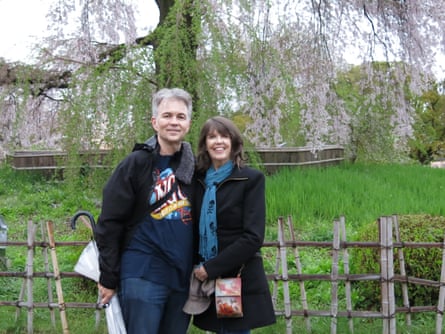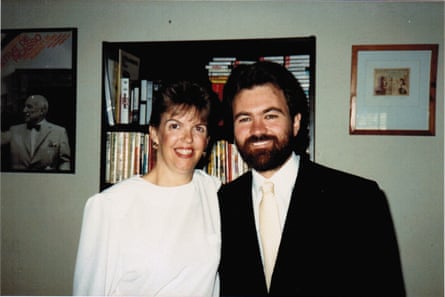I’d seen Trenna a couple of times through mutual friends. At first we showed little interest in each other. She was a smoker and I had a beard, traits that were mutually offputting. But in early January 1988, not long after we’d first been introduced, we found ourselves at the same party. She’d given up smoking as a New Year’s resolution and I’d shaved my beard off in exchange for a keg of beer from a mate.
We got chatting; it was just small talk. But when Trenna’s friend arrived to give her a lift home, she took it upon herself to write down Trenna’s number on a bus ticket and give it to me.
A few days later I called and we arranged to meet at an Indian restaurant. The conversation flowed easily; we shared similar values and were both interested in live music. She seemed to know a lot about bands from the 60s, which was strange – unless she was a few years older than me.
When she went to the bathroom I wrestled with my conscience for about half a second then picked up her purse to check her driver’s licence. We were both 30. It turned out she had learned about all these bands from her two older sisters.
We started talking about her family, and that was a moment that changed my life. Her story was so amazing to me and so different from my own. It just made me totally fascinated with her.
Trenna explained she had a genetic condition called Marfan syndrome. Her mother had it too and died when Trenna was just two. Her father was unable to care for the children and died a few years later himself. She was a ward of the state for 13 years. When she was 15, the children’s home she was living in was closing down and rather than sending her to boarding school, as they might have, they said to her: you’ve got this condition that’s going to kill you before too long, and because of that you’re not likely to find a husband, so you better go off to business school so you can support yourself until the inevitable happens.
Both Trenna’s mother and grandmother had died in their early 30s as a result of complications from Marfan syndrome, and she’d been told all her life she was destined for a similar fate.
She was sent away to Perth in 1973, totally unsupervised. It’s amazing she didn’t go completely off the rails, but she definitely had a few stories to tell.
All of this she revealed on that first date, adding that she expected to die with no warning in the next couple of years. And because of that she wasn’t that interested in getting into any serious kind of relationship.
The way she told me about all this wasn’t full of anger or self-pity, it was just so matter-of-fact. I’d come to learn that was the way she looked at life generally.
On that first date it was clear to me that she had so much to give, was so thoughtful of others and so interesting. She just totally captivated me and I wanted to spend whatever time she had left with her.
after newsletter promotion

We stuck together after that and got married just over a year later. The thinking was that we’d enjoy it while it lasted.
Just a few months into our marriage she had a cardiac incident. Advances in medical science meant she was a candidate for potentially life-extending surgery and lived until she was 63.
We were married for over 30 years, but never had any real sense of when her time would come. Living with that kind of uncertainty affects people differently, but I’m convinced it made us closer. We shared everything – the blessings and the burdens.
I reflect on our three decades together: they were all good years. People talk about low times in their marriage and we had fairly well none of those. It was a beautiful life we shared.
Her unerring ability to apply common sense to a situation was remarkable and her consideration and acceptance of others was inspirational. Even in her absence her approach to life guides the way I live, but I’ll never be as good at it as her.
Greg Mahney has built a website dedicated to telling Trenna’s life and stories at trennamahney.com
Do you have a romantic realisation you would like to share? Email australia.lifestyle@theguardian.com with “The moment I knew” in the subject line, and a brief description of your story, to be considered for future columns
Credit: Source link




